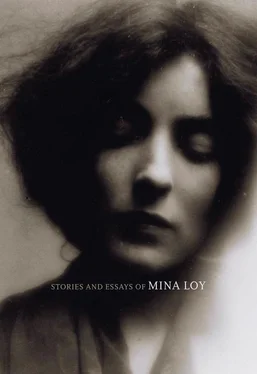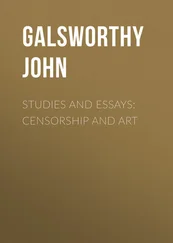Mina Loy - Stories and Essays of Mina Loy
Здесь есть возможность читать онлайн «Mina Loy - Stories and Essays of Mina Loy» весь текст электронной книги совершенно бесплатно (целиком полную версию без сокращений). В некоторых случаях можно слушать аудио, скачать через торрент в формате fb2 и присутствует краткое содержание. Год выпуска: 2011, Издательство: Dalkey Archive Press, Жанр: Современная проза, на английском языке. Описание произведения, (предисловие) а так же отзывы посетителей доступны на портале библиотеки ЛибКат.
- Название:Stories and Essays of Mina Loy
- Автор:
- Издательство:Dalkey Archive Press
- Жанр:
- Год:2011
- ISBN:нет данных
- Рейтинг книги:3 / 5. Голосов: 1
-
Избранное:Добавить в избранное
- Отзывы:
-
Ваша оценка:
- 60
- 1
- 2
- 3
- 4
- 5
Stories and Essays of Mina Loy: краткое содержание, описание и аннотация
Предлагаем к чтению аннотацию, описание, краткое содержание или предисловие (зависит от того, что написал сам автор книги «Stories and Essays of Mina Loy»). Если вы не нашли необходимую информацию о книге — напишите в комментариях, мы постараемся отыскать её.
Stories and Essays of Mina Loy
Stories and Essays of Mina Loy — читать онлайн бесплатно полную книгу (весь текст) целиком
Ниже представлен текст книги, разбитый по страницам. Система сохранения места последней прочитанной страницы, позволяет с удобством читать онлайн бесплатно книгу «Stories and Essays of Mina Loy», без необходимости каждый раз заново искать на чём Вы остановились. Поставьте закладку, и сможете в любой момент перейти на страницу, на которой закончили чтение.
Интервал:
Закладка:
Jack “knew” what there is to be known, yet in the light of actual life, he did not know.
He was not bewildered by the strange convulsion of his breath when certain women passed him in the street.
But then they shone.
Their powder and their rouge seemed only the scintillating pulveresence in the radius of an arc-light.
They could not be covered. Their clothes were only added to them for the same purpose as the dog’s feathers in the unsolvable riddle.
He knew of desire, and its promise of appeasement. The flesh of these women was of iridescent substance.
The man and the woman who had — most negligible of all the actualities, to the child — begotten him, were grey of hue and scrubby.
He could conceive of no magic that might spread a light on his mother’s dusty curls.
They were there poor beasts, obviously, to feed him, that must be all.
And yet without realising, he knew their poverty to be blessed.
The neighbours sold more sightly goods, their shops were bright with paint.
But there were nowhere, among them, such concerted eyes, such irkless silences between a husband and wife, as in the rag-shop.
The rickety sort of balcony-attic in which Jack slept seemed to him the platform of a visionary railway station at which the express of the future was always overdue. He did not, like his parents to their room, retire to it; he was always starting out from it after blank uncalculated interims of sleep, sparsely sequined with dreams of what his ego had alone selected as compatible for his building stuff, from among the provisions of the rag shop: coins.
Dreams of coins.
Except for this, “home” merely tripped him into black pools of unconsciousness punctuating his hurry of life.
He must make up for his parents’ lost time.
+
“Now you be off to school!”
“Aw rot! That man stuck up in the desk there, ’es ’arf a corpse a’ready. If I’m to look at ’im any longer, I’ll grow like ’im. ’Es underpaid, that’s wot ’e is.”
“ ’Es doin’ ’is duty.”
“Aw, paw, ’e ain’t doin ’is duty. ’Es ’avin’ me on. Wot th’great ’ell d’yer think I can learn from a man wots underpaid? Don’t it prove ’e knows nothing? Would ’e stand for it if ’e ’ad any wits?”
“Well me boy, we can’t hoil be millionhairs.”
“Aw can’t we? An’ oo sez we can’t I’d like ter know? Not nobody didn’t. Oo is it ’as ’angs the little labels on the babies wot is allowed? Jus’ so’s nobody won’t interfere with ’em, I serpose.
“Not ’arf! Hinglands’ a free country hain’t it? Or hain’t it?”
“If yer wants ter be a millionhair yer’ll ’ ave ter stick ter yer ’rittimetick, now then?”
“Yer can’t,” said Jack, “make no mistakes about money. Not if yer love it.”
“Yer got ter count it.”
“Bah, yer bin countin’ all yer life, an’ where’s it got yer?
“Wot yer got ter do is to ’ ave money. The money will count itself. Never yer fear.”
“Now do yer know wot yer talks like? Like a yid.”
“Yer see ’ere, paw, I’m all fed up with this ’ere lack o’ patriotism, everybody takin’ it fer granted nobody can’t ’ave any interlect, ’ceptin’ ther bloody Jews.
“I’ll show them!”
“Jacky, Jacky, ’ave a care, with orl yer persumpshun,” warned mother Sider.
“It’s right down dangerous to talk wot yer bin talkin’ to yer pore par.
“D’yer know that there’s other things wot’s a’most as orful as Jews theirselves, an’ them is crim’nals.
“ ’Ave a care that all this blither abart money don’t lead yer ter crime, one day or ’nother.
“Fer it’s money wot’s ther temptation of ther devil.
“Think on yer pore ma, me dear, think er yer pore pa, and leave all that there evil to the gentry wot the Lord ’as born to it.”
Jack, who at the mention of crime, had begun to hum, more than unconcernedly, sauntered out of the shop.
Jack Sider’s values were not his mother’s nor his father’s.
In the back parlour of a not far distant pub, he stood conversing with his friends. A circle that had been much depleted by the removal of Hyde Park’s parents; a circle that was on the watch for new talent.
“ ’E’s quick, ’e is, and slim. It’s a great thing, slimness in young ’uns, yer can use ’em in a variety o’ ways.”
“Oos tooterin’ ’im?”
“Long Sloan, ’ere.”
“Wot ’im! ’E’s some tooter, I don’t think! Look ’ow ’is young ’Ide Park turned out, that’s a pretty bit o’ tooterin’ to my mind.”
“Wot, Long? ’E’s tootered some o’ the best wot’s never bin cotched. Yer ferget, that child o’ Handrew’s, ’e was always habnormal. There weren’t nothing to be done with ’im. ’Is Par ’isself got reglar wore out with ’im, if it ’adn’t been fer the strain, I betcher he wouldn’t be in now.”
“Well, young un do yer feel up to joinin’ us on our privit ’scursion down ter ’Enly?”
“Gummy I do,” said Jacky.
“An’ looke ’ere. Yer only a beginner an’ yer can’t expec’ tir divide up, not yet. That’ll come. Say we give yer tew shillins fer yer evenin’?”
“O that’ll come, will it? Yer don’t say! Well it ’ as come, mind yer, or I ’ asn’t —
“This ain’t no perfeshun where youth ain’t no disadvantage, it ain’t. Why I’m quicker than the lot o’ yer. An’ besides,” he jibed, “I’m still a pure one; I ain’t got to ’ave no fear o’ the perlice. They’d give me — — O much more nir ten shillins, jus’ fer yer address.”
“Quick is ’e, quick is ’e? I told yer ’e’d be boss o’ the ’ole gang before he was bearded. That boy,” roared Long Sloan delightedly, “ ’e’s a compensation, that’s what ’e is ter me, a compensation for all the disappointments that ever ’appened to me. Especially ’Ide Park.”
+
It was not difficult for the Siders’s son to be out at night. If the parental horizon was limited, he had the external liberty of children whose parents’ lives are self-contained.
Having bred him and fed him the Siders assumed, except on such occasions as his nimble ambitions alarmed them, that as things went very well with them, they were going well with him.
The private excursion arrived at Henley; to be exact, right under the shrubbery of Mrs. Switheringham Bates’s riverside bungalow, which had become known to them through her prodigal connection with the mission house. They had been able to ascertain the periods of her absences in town, and tonight they expected an easy job, avoiding the servants’ quarters.
It was a still night. And as the stillness deepened, the slim one, hoisted on the shoulders of a senior, grasped a window sill.
In those days, to their hygienic experience an open window at night meant negligence and disoccupation. This gaping asunder of the cottage façade had met with them like a providence, determining their choice of entry.
Jacky had hauled himself onto the sill, enforced by the nether man’s vertical arm, and peered into a yawning blackness—
It was at this moment intruded upon by a lighted candle that illumined the pane of glass like a moon.
His burglarous caryatid dropped from beneath him and his own unmistakeable silhouette remained where it was.
“What do you want?” asked Mrs. Bates, as one who addresses a servant, holding the silver candlestick still steadily.
“What are you doing on my window-sill — at this hour of the night? Who are you?”
Jacky’s brain broke on the crisis. Into the rift there wedged itself, an associated idea.
Читать дальшеИнтервал:
Закладка:
Похожие книги на «Stories and Essays of Mina Loy»
Представляем Вашему вниманию похожие книги на «Stories and Essays of Mina Loy» списком для выбора. Мы отобрали схожую по названию и смыслу литературу в надежде предоставить читателям больше вариантов отыскать новые, интересные, ещё непрочитанные произведения.
Обсуждение, отзывы о книге «Stories and Essays of Mina Loy» и просто собственные мнения читателей. Оставьте ваши комментарии, напишите, что Вы думаете о произведении, его смысле или главных героях. Укажите что конкретно понравилось, а что нет, и почему Вы так считаете.












